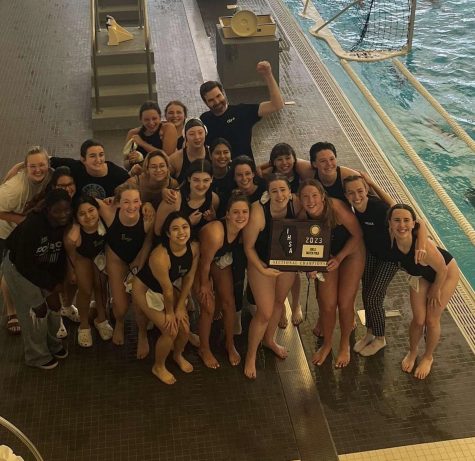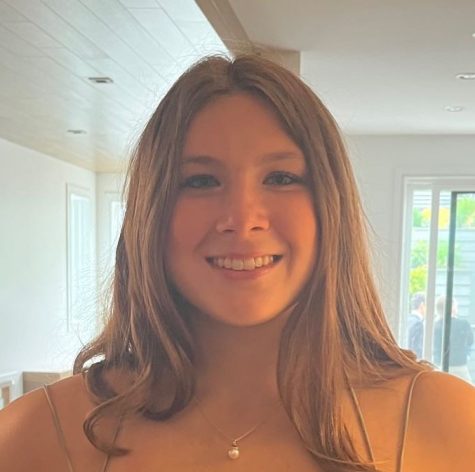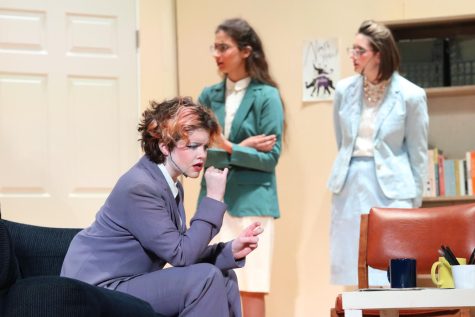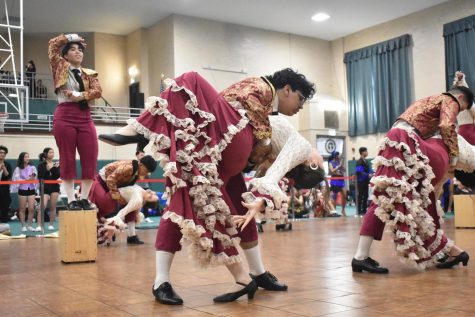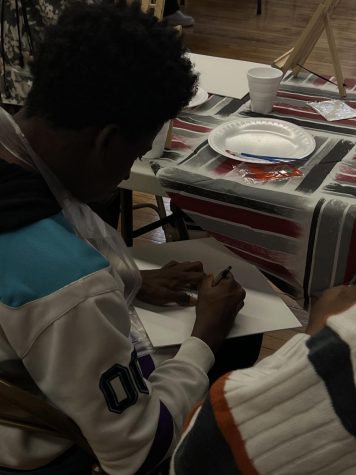Skin-deep realities: A review of ‘Another Word for Beauty’
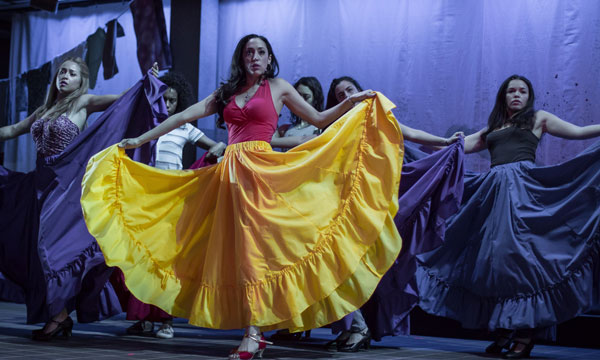
In “Another Word for Beauty,” one of the most vivid scenes takes place within the prison, where Jeimi leads a dance class for the participating inmates.
Is the best part of you your beauty? Or is it the individualistic traits you’ve acquired? Or maybe the ones you were born with? Well, it probably doesn’t matter anyway. In the world premiere in January 2016 of “Another Word for Beauty” at the Goodman Theatre, written by José Rivera and directed by Steve Cosson, there really is no other word for beauty. Sometimes, the best part of anyone might just be their outer appearance.
This production begins with the “Mermaid,” the old woman who narrates the happenings before and during the beauty pageant in a Colombian women prison, Buen Pastor. This prison is divided by “Patios” where each area has its own challenges. They are all preparing for the pageant as the winner is known to gain the respect of all the other women and is the “queen” for an entire year. It’s an appealing title for women who never really had much to begin with. But Another Word for Beauty makes the audience question the integrity and pride of it all.
The play raises a great amount of questions, and because of this, I am convinced that Rivera himself has no idea how to answer them. The point of Another Word for Beauty is very unclear and the audience gets a little substance at the end but it was evident that as people left the theatre, they were asking each other what the play was even about.
So, I will attempt at answering the questions I wish were discussed within the play. Throughout Another Word for Beauty, the choreography of the prisoners was very choppy and I was constantly asking myself if it was purposeful. Either way, although the music, by Héctor Buitrago, was perfect for each set and fit the scenes, I became more transfixed on the mismatching of dance moves, and the fact that the flowy skirts were being flourished at completely different times without any patterned timing. This being said, I really did enjoy watching the people within the fancy costumes made by designer Emily Rebholz and listening to their stories.
“Say it, then be it,” Jeimi, played by Yunuen Pardo, said to Luzmery, played by Danaya Esperanza. This quote applies to every hardship in the play, and I appreciated that consistency of one saying being used in many different ways. Jeimi is one of the most important characters, but she is downplayed and in the background much of the time. When her story becomes voiced toward the end, the audience sees a complete other side to this dynamic character we assumed was just another “happy-to-be-here” prisoner.
As much as I loved the stories shared onstage, I was a bit confused as to why there was not more representation. I am glad that the cast is composed of Latin American actors, but of the five women, only one is dark-skinned. This, again, embraces the idea of light-skinned people being more superior. But, again, was this intentional? I really couldn’t tell.
The comedy here-and-there shows great writing, and the actors, especially Heather Velazquez, who plays Maikelyn, play the scenes perfectly. The scenes where the characters argue are hilarious, but the undertones of adoration for each other is there if one looks for it. I love that. The only times love is really discussed is when talking about the prisoners’ lives outside of the prison, but if one looks closely, the love in the prison is there, albeit a different kind.
For the entire first part of the play, I was waiting for the disco ball to be used, but when it was finally lowered and turned on, it was the most wonderful sight. The glorious lights shined in all directions and the pageant had begun. The excitement was definitely raised and I was so very glad that the darkness of the prison was no more. The costumes were gorgeous, but were sure to emphasize the oversexualization of women, which added to the overall aroma of injustice. Here, the characters are seen questioning whether life in prison is worth it.
But first, Danny, played by Dan Domingues, shadows the seriousness and undermines the true sadness of the pageant with his own humor. Playing the oversexed host, Domingues impressively kept up an insane amount of energy throughout the entire pageant and made the audience laugh so much that they forgot to see the women crying from time to time, which might have been Rivera’s point all along.
This was the first time I felt so much for the five women, when they were asked silly questions, like “If you could ask God for anything, what would it be?” Because for many, their suffering can destroy all hope. And how are they supposed to answer something that they can only dream of? This was also the only thing, aside from the costumes, that resembled an actual beauty pageant.
Although Rivera does not do the best job conveying what he may had originally had in mind, Jeimi was, by far, the most authentic character who displayed a relatable story. She does not have a monologue, like all the other women, and she is seen subtly teaching the others how to win the pageant and how to deal with their lives. Jeimi is always seen smiling and dancing, teaching others how to be a “queen.”
However, by the end, she is seen breaking down on stage and wants a new life with her family just like all the other prisoners. Jeimi simply lives for others, rather than herself. And, maybe, that is her other word for beauty.
As inconsistent as “Another Word for Beauty” is, it is also its own kind of beautiful. The harsh reality that beauty isn’t skin-deep is displayed in a delicate way, to remind everyone that although beauty is shallow, there is so much more to life than beauty. There is all of our happinesses and all of our faults. And especially everything in-between.
Is the best part of you your beauty? Well, it doesn’t matter anyway.
Thank you!! We met our goal for the 2023-24 school year! Your contributions covered our annual website hosting costs, which are no longer covered by our district/school. Student journalists at Lane Tech use this archive to research past coverage of various topics and link to past stories to offer readers additional context for current stories. Thank you for supporting the award-winning reporting and writing of journalism students at Lane Tech College Prep!
Background information on why the school district no longer allows our school to cover web hosting costs:
https://lanetechchampion.org/12583/uncategorized/special-coverage-impact-of-soppa-on-cps-students-teachers/
https://lanetechchampion.org/11702/opinion/staff-editorial-cpss-soppa-policy-is-choking-students-learning-and-the-champion/
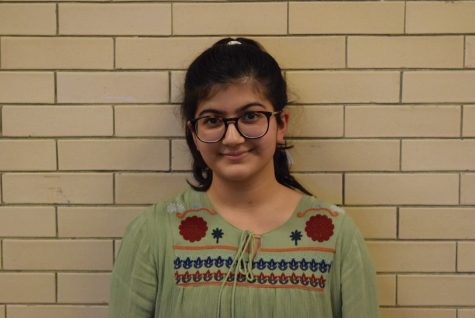
Anum Shafqat is the Editor-in-Chief of The Warrior. She has been pursuing journalism in high school for three years. With a love for television, red velvet...



